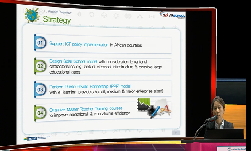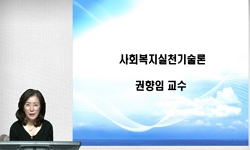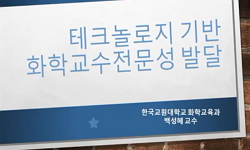Under the context of the recent curriculum reform in Mongolia emphasizing technoloy integration in schools, the main purpose of this study was to examine external and internal factors that influence teachers’ use of technology. This study aimed to i...
http://chineseinput.net/에서 pinyin(병음)방식으로 중국어를 변환할 수 있습니다.
변환된 중국어를 복사하여 사용하시면 됩니다.
- 中文 을 입력하시려면 zhongwen을 입력하시고 space를누르시면됩니다.
- 北京 을 입력하시려면 beijing을 입력하시고 space를 누르시면 됩니다.

Exploring the Relationship Between School Support and Technology Use among Mongolian Teachers: The Mediating Role of TPACK
한글로보기https://www.riss.kr/link?id=A107380815
-
저자
Bolor Davaasuren (이화여자대학교) ; 소효정 (이화여자대학교) ; 류다현 (이화여자대학교)
- 발행기관
- 학술지명
- 권호사항
-
발행연도
2021
-
작성언어
English
- 주제어
-
등재정보
KCI등재
-
자료형태
학술저널
- 발행기관 URL
-
수록면
23-55(33쪽)
-
KCI 피인용횟수
0
- DOI식별코드
- 제공처
- 소장기관
-
0
상세조회 -
0
다운로드
부가정보
다국어 초록 (Multilingual Abstract)
Under the context of the recent curriculum reform in Mongolia emphasizing technoloy integration in schools, the main purpose of this study was to examine external and internal factors that influence teachers’ use of technology. This study aimed to investigate structural relationships between school support, technology use, and TPACK (Technological Pedagogical and Content Knowledge) among Mongolian secondary school teachers. This study was conducted with 208 secondary school teachers in Ulaanbaatar, Mongolia. Data were collected through an instrument that measures three factors: teachers’ use of technology, TPACK, and school support. The results indicate that TPACK has a partial mediation effect on the relationship between school support and the use of technoloy. The contribution of this study lies that it examines the complex relationships between internal and external factors affecting teachers’ technology integration, especially among Mongolian teachers who are less researched in the existing literature.
다국어 초록 (Multilingual Abstract)
Under the context of the recent curriculum reform in Mongolia emphasizing technoloy integration in schools, the main purpose of this study was to examine external and internal factors that influence teachers’ use of technology. This study aimed to i...
Under the context of the recent curriculum reform in Mongolia emphasizing technoloy integration in schools, the main purpose of this study was to examine external and internal factors that influence teachers’ use of technology. This study aimed to investigate structural relationships between school support, technology use, and TPACK (Technological Pedagogical and Content Knowledge) among Mongolian secondary school teachers. This study was conducted with 208 secondary school teachers in Ulaanbaatar, Mongolia. Data were collected through an instrument that measures three factors: teachers’ use of technology, TPACK, and school support. The results indicate that TPACK has a partial mediation effect on the relationship between school support and the use of technoloy. The contribution of this study lies that it examines the complex relationships between internal and external factors affecting teachers’ technology integration, especially among Mongolian teachers who are less researched in the existing literature
참고문헌 (Reference)
1 이상일, "피어슨 상관계수의 공간화: 세 관련 기법 간의 비교 실험 연구" 대한지리학회 53 (53): 761-776, 2018
2 소효정, "특수학급 교사의 테크놀로지 교수내용지식(TPACK)과 테크놀로지 활용 방법 탐색" 특수교육연구소 19 (19): 189-213, 2020
3 Chen, C. H., "Why do teachers not practice what they believe regarding technology integration?" 102 (102): 63-75, 2008
4 Sanchez, S. A., "Use of ICT tools using the PBL methodology as a student learning strategy" 2018
5 Kim, D., "Unpacking teachers’ concerns about CT-based pedagogy: The case of software education in Korea" 29 (29): 66-82, 2021
6 Tondeur, J., "Understanding structural and cultural school characteristics in relation to educational change : the case of ICT integration" 35 (35): 223-235, 2009
7 Pamuk, S., "Turkish pre-service science and mathematics teachers’ computer related self-efficacies, attitudes, and the relationship between these variables" 53 (53): 454-461, 2009
8 Tondeur, J., "Towards a typology of computer use in primary education" 2 (2): 197-206, 2007
9 Jun, M. K., "The influence of quality technology support on teachers' effective technology integration in relation to the maturity of a school work environment as a professional learning community" University of Iowa 2004
10 Dawson, C., "The influence of principals’ technology training on the integration of technology into schools" 36 : 29-49, 2003
1 이상일, "피어슨 상관계수의 공간화: 세 관련 기법 간의 비교 실험 연구" 대한지리학회 53 (53): 761-776, 2018
2 소효정, "특수학급 교사의 테크놀로지 교수내용지식(TPACK)과 테크놀로지 활용 방법 탐색" 특수교육연구소 19 (19): 189-213, 2020
3 Chen, C. H., "Why do teachers not practice what they believe regarding technology integration?" 102 (102): 63-75, 2008
4 Sanchez, S. A., "Use of ICT tools using the PBL methodology as a student learning strategy" 2018
5 Kim, D., "Unpacking teachers’ concerns about CT-based pedagogy: The case of software education in Korea" 29 (29): 66-82, 2021
6 Tondeur, J., "Understanding structural and cultural school characteristics in relation to educational change : the case of ICT integration" 35 (35): 223-235, 2009
7 Pamuk, S., "Turkish pre-service science and mathematics teachers’ computer related self-efficacies, attitudes, and the relationship between these variables" 53 (53): 454-461, 2009
8 Tondeur, J., "Towards a typology of computer use in primary education" 2 (2): 197-206, 2007
9 Jun, M. K., "The influence of quality technology support on teachers' effective technology integration in relation to the maturity of a school work environment as a professional learning community" University of Iowa 2004
10 Dawson, C., "The influence of principals’ technology training on the integration of technology into schools" 36 : 29-49, 2003
11 Joo, Y. J., "The effects of secondary teachers’ technostress on the intention to use technology in South Korea" 95 : 114-122, 2016
12 An, Y., "The effects of an online professional development course on teachers’ perceptions, attitudes, self-efficacy, and behavioral intentions regarding digital game-based learning" 66 (66): 1505-1527, 2018
13 Mishra, P., "Technological pedagogical content knowledge:A new framework for teacher knowledge" 108 (108): 1017-1054, 2006
14 Malik, R. S., "Technological pedagogical content knowledge (TPACK) with information and communication technology (ICT) integration: A literature review" 2019
15 Ottenbreit-Leftwich, A. T., "Teacher value beliefs associated with using technology: Addressing professional and student needs" 55 (55): 1321-1335, 2010
16 Ertmer, P. A., "Teacher beliefs and technology integration practices : A critical relationship" 59 (59): 423-435, 2012
17 Voogt, J., "TPACK in teacher education: Are we preparing teachers to use technology for early literacy?" 26 (26): 69-83, 2017
18 United Nations Development Programme [UNDP], "Support to the implementation of the 2030 agenda for sustainable development" United Nations Development 2016
19 Kim, Y. W., "Support plan for the efficient application of ICT" 2 (2): 183-201, 2001
20 Ministry of Education, Culture and Science of Mongolia, "Statistics for 2016-2017 for primary and secondary education"
21 Sahin, Y. L., "Social networking users’ views on technology and the determination of technostress levels" 1 (1): 1437-1442, 2009
22 Lam, S. F., "School support and teacher motivation to implement project-based learning" 20 (20): 487-497, 2010
23 Trucano, M., "SABER-ICT framework paper for policy analysis: Documenting national educational technology policies around the world and their evolution over time" World Bank 2016
24 Kastberg, S., "Research on graphing calculators at the secondary level: Implications for mathematics teacher education" 5 (5): 25-37, 2005
25 Özgür, H., "Relationships between teachers’ technostress, technological pedagogical content knowledge (TPACK), school support and demographic variables: A structural equation modeling" 112 : 106-468, 2020
26 Hardman, F., "Reforming teacher education in Tanzania" 32 (32): 826-834, 2012
27 Kline, R. B., "Principles and practice of structural equation modeling" Guilford 2015
28 Williams, K. M., "Point, read, think, click: Expanding new literacies in Kazakhstan and Mongolia" 16 (16): 16-34, 2020
29 Law, N., "Pedagogy and ICT use in schools around the world: Findings from the IEA SITES 2006 study" Springer Science & Business Media 2008
30 Hair, J. F., "Multivariate data analysis" Pears on Education, Inc 2009
31 Miangah, T. M., "Mobile-assisted language learning" 3 (3): 309-319, 2012
32 Kaliisa, R., "Mobile learning in higher education: A comparative analysis of developed and developing country contexts" 50 (50): 546-561, 2019
33 "Ministry of Education, Culture and Science of Mongolia"
34 Bebell, D., "Measuring teachers’ technology uses : Why multiple-measures are more revealing" 37 (37): 45-63, 2004
35 So, H. J., "Learning about problem-based learning: Student teachers integrating technology, pedagogy and content knowledge" 25 (25): 101-116, 2009
36 Tondeur, J., "Integrating ICT in Kenyan secondary schools: an exploratory case study of a professional development programme" 24 (24): 565-584, 2015
37 Khokhar, A. J., "Information communication technology integration: Trained secondary school teachers’ dilemma" 5 (5): 94-02, 2017
38 Saddhono, K., "Indonesian language teachers’ attitudes toward ICT utilization in learning for elementary school in Surakarta" 2018
39 Karunaratne, T., "Implementing small scale ICT projects in developing countries: How challenging is it?" 14 (14): 18-140, 2018
40 O'Dwyer, L. M., "Identifying teacher, school, and district characteristics associated with middle and high school teachers' use of technology : A multilevel perspective" 33 (33): 369-393, 2005
41 Tondeur, J., "ICT integration in the classroom : Challenging the potential of a school policy" 51 (51): 212-223, 2008
42 Information and Communication Industry Promotion Agency [ICIPA], "ICT & Broadcasting MONGOLIA Market report"
43 Information and Communication Industry Promotion Agency [ICIPA], "ICT & Broadcasting MONGOLIA Market report"
44 Becker, H. J., "How exemplary computer-using teachers differ from other teachers: Implications for realizing the potential of computers in schools" 26 (26): 291-321, 1994
45 Organisation for Economic Co-operation and Development [OECD], "Highlights from Education at a glance 2009"
46 Kozma, R. B., "Handbook of research on educational communications and technology" Springer 885-894, 2014
47 Dalal, M., "Fostering the growth of TPACK among international teachers of developing nations through a cultural exchange program" 43-56, 2021
48 Gil-Flores, J., "Factors that explain the use of ICT in secondary-education classrooms : The role of teacher characteristics and school infrastructure" 68 : 441-449, 2017
49 Zhu, D. S., "Factors that affect public intention to share social justice report using mobile phone in Mongolia" 2016
50 Joo, Y. J., "Factors influencing preservice teachers’ intention to use technology: TPACK, teacher self-efficacy, and technology acceptance model" 21 (21): 48-59, 2018
51 Blackwell, C. K., "Factors influencing digital technology use in early childhood education" 77 : 82-90, 2014
52 Dong, Y., "Exploring the structural relationship among teachers’ technostress, technological pedagogical content knowledge (TPACK), computer self-efficacy and school support" 1-11, 2019
53 Koh, J. H. L., "Examining practicing teachers’ perceptions of technological pedagogical content knowledge (TPACK) pathways: A structural equation modeling approach" 41 (41): 793-809, 2013
54 Ventayen, R. J. M., "Educator’s competencies on the application of technological tools in teaching" 8 (8): 1-7, 2019
55 Malik, R. S., "Educational challenges in 21st century and sustainable development" 2 (2): 9-20, 2018
56 Seong, T. J., "Easy-to-understand statistical analysis" Hakjisa 2019
57 Koh, J. H. L., "Developing Indonesia teachers’ technological pedagogical content knowledge for 21st century learning (TPACK-21CL) through a multi-prong approach" 3 (3): 11-33, 2018
58 Koh, J. H. L., "Demographic factors, TPACK constructs, and teachers' perceptions of constructivist-oriented TPACK" 17 (17): 185-196, 2014
59 Lee, J. C., "Correlation analysis between elementary school teachers' technology use and TPACK (Technology, Pedagogy, and Content Knowledge)" 24 (24): 599-606, 2016
60 Kihoza, P., "Classroom ICT integration in Tanzania: Opportunities and challenges from the perspectives of TPACK and SAMR models" 12 (12): 107-128, 2016
61 Sobel, M. E., "Asymptotic confidence intervals for indirect effects in structural equation models" 13 : 290-312, 1982
62 Lee, K., "Analyzing the influence of teachers' learning community on class effectiveness: Focusing on the comparison of teachers' and students' perceptions" 14 (14): 87-107, 2019
63 Lee, J. W., "Analysis of correlation between elementary school teachers' technology use and TPACK (Technology, Pedagogy, and Content Knowledge)" 24 (24): 181-182, 2016
64 Mongolian Teacher Education Research Institute [TERI], "2020 teacher education status report"
65 Mongolian Teacher Education Research Institute [TERI], "2019 teacher education status report"
66 Mongolian Teacher Education Research Institute [TERI], "2018 teacher education status report"
67 Mongolian Teacher Education Research Institute [TERI], "2013 teacher education status report"
동일학술지(권/호) 다른 논문
-
- 한국교육공학회
- 임태형
- 2021
- KCI등재
-
- 한국교육공학회
- 성은모
- 2021
- KCI등재
-
The Effect of Social-Emotional Competency on College Students in South Korea
- 한국교육공학회
- 김은정
- 2021
- KCI등재
분석정보
인용정보 인용지수 설명보기
학술지 이력
| 연월일 | 이력구분 | 이력상세 | 등재구분 |
|---|---|---|---|
| 2022 | 평가예정 | 재인증평가 신청대상 (재인증) | |
| 2019-01-01 | 평가 | 등재학술지 선정 (계속평가) |  |
| 2018-12-01 | 평가 | 등재후보로 하락 (계속평가) |  |
| 2015-01-01 | 평가 | 등재학술지 유지 (등재유지) |  |
| 2011-01-01 | 평가 | 등재학술지 선정 (등재후보2차) |  |
| 2010-01-01 | 평가 | 등재후보 1차 PASS (등재후보1차) |  |
| 2008-01-01 | 평가 | 등재후보학술지 선정 (신규평가) |  |
학술지 인용정보
| 기준연도 | WOS-KCI 통합IF(2년) | KCIF(2년) | KCIF(3년) |
|---|---|---|---|
| 2016 | 0.15 | 0.15 | 0.2 |
| KCIF(4년) | KCIF(5년) | 중심성지수(3년) | 즉시성지수 |
| 0.15 | 0.13 | 0.517 | 0.27 |




 ScienceON
ScienceON KISS
KISS






